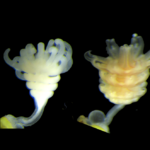Why is it that we seem to have moved away from celebrating images like the one above left (a big game hunter posing over a dead African lion) yet seem to have no problem with the the image above right (a fishing party with their 1,320 pound dead Blue marlin caught off Ascension Island in the South Atlantic Ocean)?
How is this:
Fundamentally different from this:
Why do we seem so resistant to seeing fish (marlin, shark… whatever) as wildlife?









I have a feeling the cuddly mammal effect is at play. That’s why people object to lions, harp seals, whales, et al. being killed, but don’t blink when they see shark or marlin trophy shots. Phylogenetic distance, and all the differences in anatomy that brings, makes a difference. More people want to snuggle a seal than care about fish.
But I also think there’s a great deal of ignorance about ocean conservation. There are plenty of documentaries that showcase the wonder of the sea, for example, but they hardly ever mention conservation issues. Documentary creators often consider conservation issues to be too depressing to air, and, even if the shows are shot, they are not aired. (If I recall correctly, that’s what happened with the American airing of the BBC’s ‘Blue Planet’.) Granted, the information is out there for those who look, but how many people are looking? On top of that, with the exception of polar bears (again, floofy mammals), conservation issues are often obscured in mass media. I don’t have data to support this – bad scientist, I know! – but it’s my gut feeling, and I’d be interested in learning more about how much people know (or don’t!) about the state of the seas.
All things are to disappear in this manner? IDIOTS…. because the humans will die at the same times if the nature dissapear….
I agree with the “cuddly animal” aspect. We relate to mammals above all other classes of animals, because we are mammals. We see something (affection, personality, etc.) behind those eyes and their behavior, which is why it affects us on an emotional level. Most mammal species also exhibit social structures and bonds. A majority of humans don’t have that same connection with fish, reptiles/amphibians, insects, etc.
I think another reason, as you pointed out, is that people are ignorant of the state of the seas. The sea has always for man been seen as “the big and bountiful”, an endless supply of food, gaming, etc. Sport fishing and overfishing problems do not get the attention they deserve, save for once again marine mammals (whale, dolphin, manatee/dugong and seal conservation). If people would stop and look at the big picture, that we are all connected in a beautiful web and all have an effect on the greater system (whether better or worse) maybe things would change.
1. People eat the marlin, nobody eats lion. Fishing is not just for sport.
2. There is nothing wrong with catching a huge fish, the problem lies in how many fish you catch.
3. Both animals are beautiful, but one is being used to feed a village, the other is one is being used to feed a wimpy man’s ego. That is the difference.
1) Color me skeptical on the “nobody eats lion” assertion. I used to work at Savenor’s Market in Cambridge MA as a grad student. Savenor’s carried game meats, among them lion. I’m not suggesting it’s a popular commodity, but it’s eaten. Not that I think the hunter actually ate his prize But I similarly don’t think those fellows around the marlin were salivating for marlin steaks. And while it’s nice to think that marlin fed a village, I suspect it’s a just so story.
2) There IS something wrong with removing a big fish from the gene pool. Bigger fish… more eggs. More eggs… more fish.
3) See 1.
In Response:
1. Nobody eats Lion: you sure about that? Hunting wild game on land is not just for sport as well as I think we all know.
2. Agreed, and the problem is with extreme population decline.
3. Both are used to feed villages. Both are used to feed wimpy men’s egos.
No difference. We are debating why people have different thoughts and feelings on it. That’s the arguement.
Ha :) totally agreed RickMac, you just beat me to my point as I was writing on this slow browser!
We need a Tuna version of “The Lion King”…People feel bad about killing Simba. There were no big Tuna in “Finding Nemo”…if a clown fish was strung up like that…God help us.
Come on Disney…make it happen.
Just realized that was a marlin…but you get the idea
There is no difference except for what has been mentioned by Brian and Jordan. When I was growing up stranded whales and dolphins used to have people’s initials carved into them and cigarette butts shoved down their blowholes. With captivity and documentary programs showing these animals as “cuddly” our attitudes and knowledge started to change, but for a while there they were alien to us and treated like fish. Even within mammals there are charismatic ones we feel more empathy for (like the lion) and those we seem to have no connection to (like bats). A healthy ocean needs large predators like the marlin, as does the species’ gene pool. I find both images repulsive and wish people could get their thrills doing productive and benign things instead.
Thanks, Travis. I just have three words in rebuttal to this “cuddly/floofy mammal” hypothesis: Naked Mole Rat
But seriously, I’d like to test your “Cuddly Hypothesis” (or Brian’s “floofy mammal hypothesis) a bit with an iconic ocean species mentioned a lot around DSN. When I think of my visits to the Oceans Hall at the Smithsonian National Museum of Natural History, or the Te Papa Museum in New Zealand, the biggest crowds have been around the Giant Squid or Colossal squid exhibits. Nothing cute, cuddly, or floofy about a massive Cthulhuian invertebrate floating in preservative and glycol. Just utter fascination. Maybe even respect? I acknowledge that maybe the “weird” factor trumps “cuddle” factor with giant squids. But I don’t see fishing charters (other than academic cruises) in competition with an intent to haul up the next Architeuthis trophy. Why do squids get a pass as awe-inspiring, majestic wildlife, but not sharks or other big fish?
Maybe not Architeuthis, but here in San Diego people definitely go on charters for Humboldt squid fishing, taking hundreds on a single trip. http://www.utsandiego.com/news/2013/jan/06/giant-squid-invade-san-diego-waters/
You should do a follow-up post showing a picture of a man holding up a birdshot quail vs a man holding up a caught trout.
The type of animals people care about tend to be “charismatic megafauna” as I’ve been told by my oceanographer friends. We fight to save the elephants and the whales, but I’ve yet to see anyone bemoan the extinction of an exotic bacterial species.
To those of you who think that “cuddly” fish, like clownfish are less likely to be exploited, I give you this fact: after the movie Finding Nemo (which is a film about a clownfish who is plucked from the wild to be imprisoned in a tank, separated from his family, and almost killed by a crazy little girl), sales of clownfish TRIPLED. Oh, the irony. After watching a movie about a poor little clownfish that is captured from the wild, kids wanted their OWN little clownfish, many of which were captured from the wild (see this blog for a good background: http://www.realclearscience.com/blog/2012/01/Finding-Nemo-3D-Kill-Fish.html).
I don’t know where this cognitive dissonance is coming from, or how it is possible to feel sorry for poor little Nemo, and then immediately go out and buy your own little Nemo. The makers of Finding Nemo did an excellent job, but people just did not get it.
Would the effect on clownfish have been the same if Pixar had added some text like, “Don’t go out and buy a wild-caught clownfish, or you will be just like the mean Dentist in this movie”? I wouldn’t have thought that was a necessary statement to make, but somehow, some people didn’t make the connection. Maybe what we are suffering from in conservation isn’t a science knowledge deficit (the relevancy of which was discussed at Scio13: http://scio13.wikispaces.com/Session+3A) , it’s a connection-making deficit. The kind that connects “If we kill the cool things” and “they will not be here anymore.”
Brian: In 1999, The Ocean Project completed what remains the most comprehensive opinion research on public attitudes, perceptions, and knowledge of the ocean ever conducted. In a national telephone survey, they sampled 1,500 Americans across a broad gender, racial, age, educational, socioeconomic, and geographic spectrum. Respondents represented coastal and land-locked lifestyles.
The Ocean Project research summary report indicated that Americans are unaware of the threats to ocean health and they greatly underestimate their own role in damaging the oceans. The public primarily values the oceans for their recreational and emotional aspects, but their understanding of why we need the oceans is superficial.
Consequently, while many Americans express an emotional connection to the oceans, awareness and concerns about the oceans’ health are low. Most ocean environmental awareness and understanding that was demonstrated was confined to impacts to beaches and other coastal habitats which respondents could visit. There was no demonstrable correlation between factual knowledge of oceans across respondents and their overall level of concern (to Alexis’ comment about the “science knowledge deficit” trope). In other words, people who knew more facts about the ocean demonstrated no appreciably greater concern for that environment.
Eating marlin that big = mega mercury meal.
Thanks, Jenny! Are Humboldt edible (ie tissue not ammoniated as in giants)? And do you know if there is a regulated Humboldt fishery (season, catch limits, etc). I ask because if it’s managed as a fishery for consumption, it places it in a somewhat different category than the sort of “trophy” sense that the images in this post conjure up.
It’s myth versus facts, assumptions versus reality, seeing and not seeing!
Surely not all the people on blue planet have seen lions live but most of them know what is a lion and how does a lion look like, people would make a link to something they know they would also sympathize more with what they know or have seen, read about or played with as stuffed toy. There are a lot of world wide campaigns to defended, conserve and sustain the oceans, fish and sharks but most of the time the global supporters are the same people our marine protection snow ball is not growing bigger I guess, I can feel that when we have direct interaction with people, moreover social media platforms like Facebook should free page advertsing for NGO especially marine specialized one in order to reach a wider audice share more about the ocean and the beautiful species there, as a diver and shark defender in Lebanese NGO we work closely with fishermen communities to engage them in protecting sharks rather then killing by stressing on the higher value they have in the water and the benefits they will get as we aim to establish marine managed areas with some diving sites where fishermen will offering their vessels as scuba charters. Still the majority of the public is afraid from sharks and they support our courage but the project!!! All Incan say is that people are strange
Notice there are men in the pictures. Testosterone-driven show offs have not been fully explored in conservation science. Somehow these men feel more “manly” after showing off the big animal they killed. I’m sure they won’t be posing in pictures showing a dead hamster or a dead minnow. Size does matter in showing off you are a great hunter or fisher. It will be interesting to explore what kind of psychological profile have these men who need to kill a big animal (terrestrial or marine) in order to feel better about themselves.
Great discussion of a complex subject. I suspect at the end of the day it all comes down to the right mix of knowledge, respect, and empathy. As a young child, my grandfather and uncles would take me fishing. I loved the tug on the line, but the minute I saw the fish out of water opening and closing its mouth, I wanted to put it back in–I’ve never lost that emotional response to seeing any organism suffer, so it is difficult if not impossible for me to appreciate what it is that drives hunters. I have seen first hand that it is powerful (in 20+ years of scuba diving, I’ve seen people fetishize their spear guns). I have also known sport hunters who over time fire less and less often. A dive buddy who lived in a rural area among men who hunted (he’d hunted as a child with his father) used to spot all the wild animals on the way to a dive site. He knew their habits, where to look for them, etc.–he was the best naturalist I have ever met, and it dawned on me that his pleasure in the sport was more in the observation than the trophy gathering. The last time we talked, he was considering swapping the gun for a camera. I’d like to think that the more people learn about the other creatures that share the planet with us (and adopt that view), the less entitled they’d feel to take those lives, but perhaps I’m dreaming.
1) Fishing IS for sport. Around where I live, there is a Shark Fishing Contest, where after all of those sharks have been slaughtered, many are simply thrown away, and only the prize winners are turned into wall mounts. No one doing that competition is eating shark. Though I’d love to believe that marlin fed someone/(s) family, the fact of the matter is that it probably didn’t. And people do eat lion, monkeys, etc. – it’s called bushmeat, and it’s a huge problem to mega-terrestrial-fauna living in Africa and Asia.
2)If everyone catches the big fish, you are left with a population that is full of very small, not-as-fit fish reproducing. That big fish had the genes an apex predator like the marlin needs to survive. But yes, the number of fish taken is also a HUGE factor.
3)See number one, and do some research. That marlin is stroking those men’s egos too. The problem people don’t see with killing wildlife is that the wildlife don’t have a fair fight. We’re using guns (that can shoot and kill before the animal even knows something’s up) and radar to track down the fish. You want a real hunt? Do it with your bare hands. That will level the playing field and make people realize that we are actually a weak prey species who’s only edge is our brain, which would be used to figure out how to run away from these amazing apex predators.
Bigger, older fish might make . But, .
Another aspect to the differing response is the “my 90 yr old grandmother could have shot that lion, but landing a big fish takes strength, skill, and luck” argument that I have often heard.
There is no difference. Both pictures hurts my soul, such negativity and lack of compassion.
When looking at both of these photos I have the same feeling. Guilt over what we have become, and sorrow for the lack of compassion these people must have to think this is “OK”
I know it is a different, but I can’t wait to get to Africa to work with a volunteer based anti poaching squad.
Just found this website, very much enjoying it thus far.